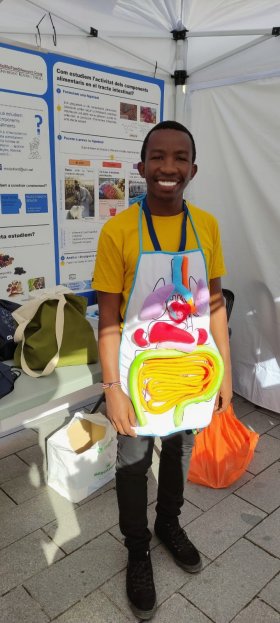Zacharia Waithaka Ng'ang'a


PhD Programme: Nutrition and Metabolism
Research group: MoBioFood – Bioactivitat Molecular dels Aliments, URV & Animal Nutrition Program, IRTA
Supervisors: Raúl Alejandro Beltrán Debón
Bio
Zacharia Waithaka Ng'ang'a obtained his bachelor's degree in Animal Health and Production from Kenyatta University, Kenya, in 2017. He worked as an intern in several institutions and companies before graduating with a thesis project that focused on the utilization and adoption of hormones in livestock production. He then worked with the Animal Nutrition department of Animix Limited, Kenya as a regional technical sales representative interacting and disseminating technical information to animal feed manufacturers, veterinarians and farmers. In 2018, he was awarded a full scholarship to study masters in Turkey. He graduated in 2021 with a Master of Science degree in Animal Breeding at Ege University with wide experience in animal science and research especially in monogastric animals. His master's thesis focused on the effects of in ovo supplementation of leptin in poultry. Zacharia is enrolled in the PhD programme, Nutrition and Metabolism at the department of biochemistry and biotechnology of Universitat Rovira I Virgili where he joined MoBio-Food Research group and is working on a collaborative project together with the Animal Nutrition Program from IRTA on the project title "Gut barrier function in livestock". Zacharia has also previously led groups, volunteered and actively participated in community services, outreach programs and advocacy activities earning him awards and recognition certificates. Zacharia has keen research interests in animal nutrition, gut health, one health, and stress physiology and seeks to improve production, overall performance of animals while promoting animal welfare.
Project: Gut barrier function in livestock: understanding the mechanisms of disruption and evaluation of possible bioactive substances to improve it
The animals' fast growth and the intensive management practices can sometimes disturb the proper maturation and functionality of their digestive system. The production environment could add stressors affecting the health and growth of animals. These stressors can include environment, nutrition, and infection. Heat stress increases the permeability, oxidative stress, and inflammatory responses in the gut. Nutritional stress from fasting, antinutritional compounds, and toxins induces the leakage and destruction of the tight junction proteins in the gut. Pathogenic and viral infections can also lead to loosening the intestinal barrier. In the past, antibiotics had been commonly used for prophylaxis or as growth promoters and probably helped controlling barrier function disturbances. However, these practices have been banned in the EU (and many other countries) due to the increased occurrences of microbial resistance to antibiotics, and therefore alternative products are needed. The alterations in the intestinal barrier often challenge homeostasis of animals which results in neuroendocrine alteration, reduced feed intake, growth rates and increased morbidity and mortality, factors that influence animal health negatively and, in the end, lower the productivity. For these reasons, it is crucial to find solutions to prevent/ameliorate/reverse intestinal barrier alterations. However, the molecular mechanisms that relate the stressors with gut barrier damage are not fully described.
Outreach activities
- European Researchers' Night 2022: "Els insectes: una font de proteïna més sostenible".
- European Researchers' Night 2023: "El gust més avall de la boca".



